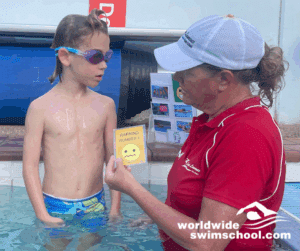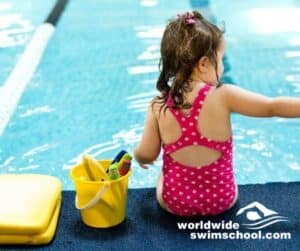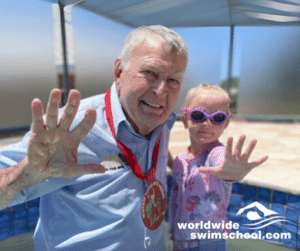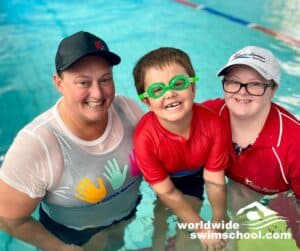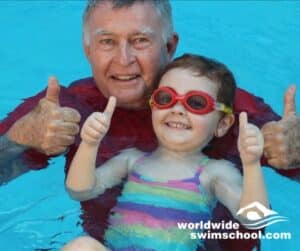When it comes to water safety for over 4's, there are a lot of things you need to think about and consider. Of course you want your children to have fun in the pool without any worries, but you also need them to know how they can stay safe when playing around in the water.
Here, we discuss some of the essential aspects that every parent needs to be aware of when their child is over four years old, and taking regular swimming lessons.
Consider Real Life Safety Concerns
You need to consider the type of facility you are taking your child to, in order to ensure water safety for over 4's. For example, if there is a basic diving board above a deep pool, discuss with your child that they should not dive in.
It’s extremely important that children learn the importance of self-preservation. It’s very easy to get into difficulty while trying to help a mate. For this reason, we should instill the following values in our swimmers:
- Call on the Swim Teacher for help
- Use reach or throw rescues first
- If you must approach someone in trouble, approach with a buoyant aid
- Always approach a person in difficulty with extreme caution

Introducing Deep Water Activities
Once children become comfortable we can introduce deep water activities. Learning to monkey around the side of the pool, edge or rail should be easy to achieve. Remember some children may be nervous with this activity so provide plenty of encouragement and support. Learning to bob underwater and push off the bottom of the pool will be the next step.
Again, this is a great warm up activity to establish good breath control and breathing rhythm. You can then progressively move towards floating and treading water before returning to safety at the side of the pool.
What we Achieve Through Water Safety?
- Reduce the risk of drowning
- Encourage safe attitudes and behaviours towards water
- Develop all-round water safety skills
- Further parent education on safety
- Teach children about their capabilities and boundaries
- Identify and respond to an emergency situation
Swimming lessons for children will give them confidence in the water and expose them to water safety skills such as safe entries and exits, floating and treading water.
Allow Swimmers to Solve Problems Themselves
You never want to solve problems for your child. Instead, encourage them to think about what might happen if they do not follow pool rules, and use their judgment to find the correct answer.
For example, if there is a rule that they should not run around in the pool area, ask them questions like “What are some things you might do if you run around in the pool area?" to encourage them to think about what they should do instead.
Creating opportunities to educate parents will also be extremely important for swimming teachers and swim schools. This education is vital and easy to achieve during parent and child classes.
Here, instructors are in direct contact with the caregiver but as children move into classes without the parents it becomes a little bit more challenging to maintain this direct communication.
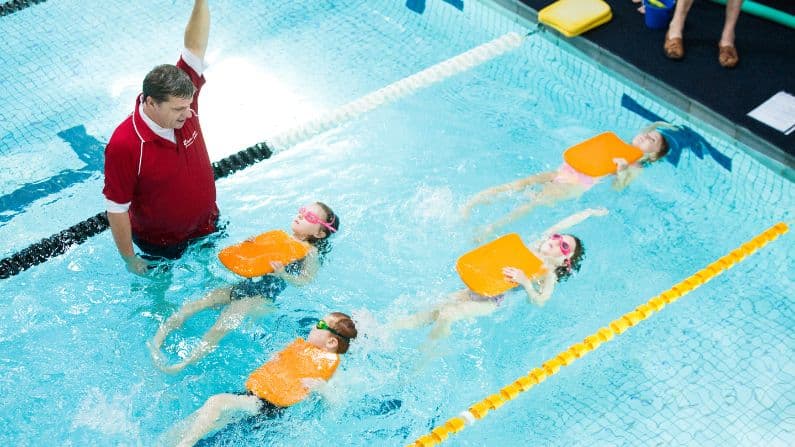
Conclusion
When it comes to water safety over 4's, water safety should be taught during the development of foundation swimming skills. This is done as we work towards teaching the competitive strokes.
For example, floating is the basis of all strokes. It is essential to develop good technique but it is also extremely important for self-preservation and survival swimming.
Therefore, great swimming programs will help to develop good technique in their swimmers. But also, it will teach water safety skills and help to develop safe behaviours and attitudes around the water. You want to keep your child safe and allow them to have fun, and be a part of the other kids.
Make sure to consider the safety concerns of the facility before going, and teach your children how they can stay safe without ruining their day.
Developing water safety skills and providing water safety education should underpin all formal swimming lessons for kids, within their learn to swim programs.
The Professional Development Academy is World Wide Swim School’s dedicated online training platform for teachers. Swim teachers can use these learning programs for upgrade professional development points towards re-accreditation.
Join our community and keep up to date with new articles, special offers - it is free to join!
Looking for more information on learning how to swim - don't go past the Swim Library.

